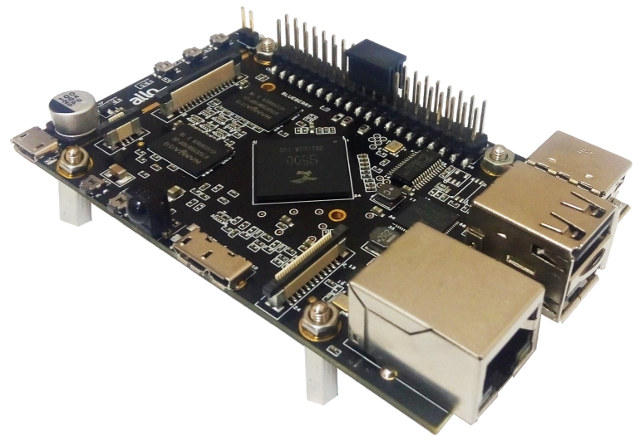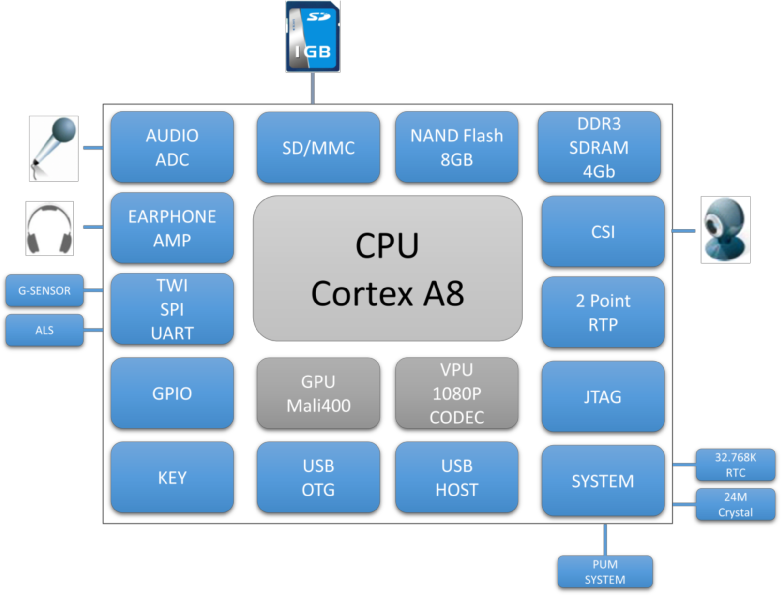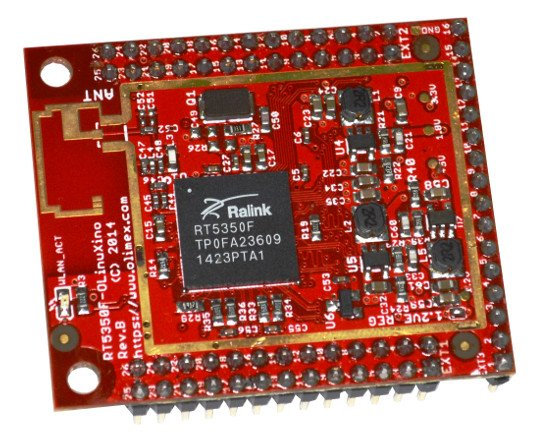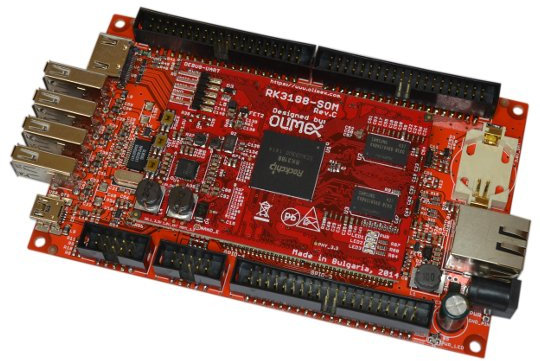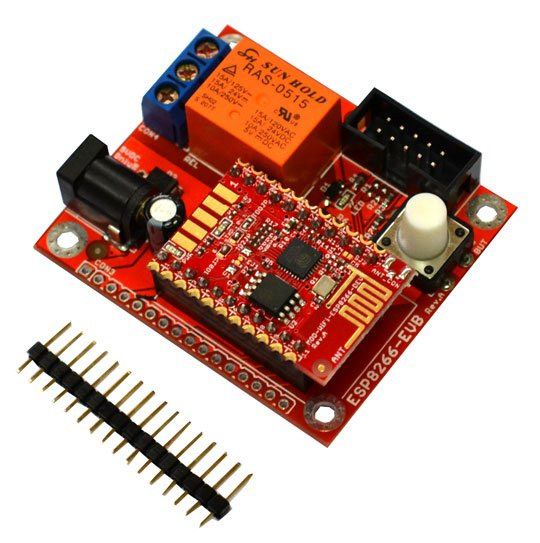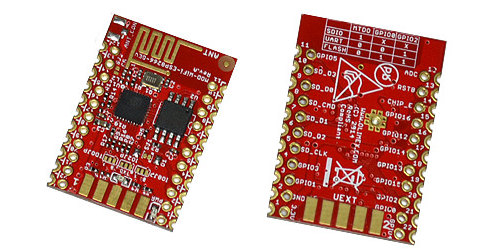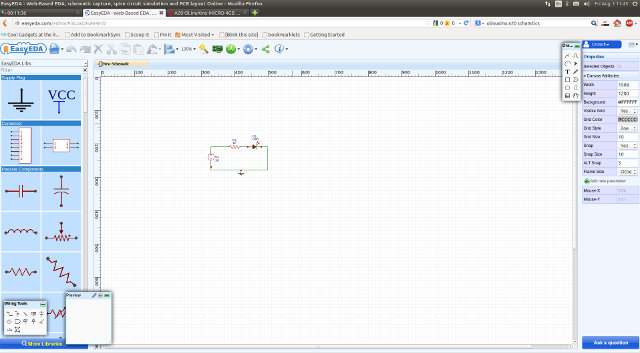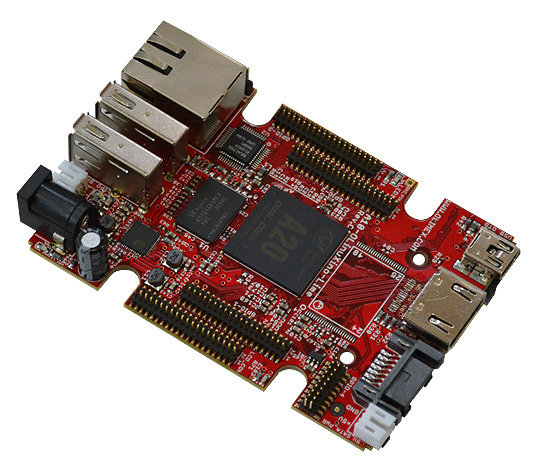Allo is a company based in Bangalore, India specializing in VoIP hardware solutions, but they’ve recently developed a single board board powered by Actions Semi S500 quad core processor that supports various Raspberry Pi HATs and can be used for multimedia, IoT, and Telecom application such as Asterix or Freeswitch PBX. Allo SPARKY board specifications: SoC – Actions Semi S500 quad core Cortex A9r4 processor with PowerVR SGX544 GPU @ 500 MHz Memory – 1 or 2GB RAM Storage – Socket for 8, 16, 32 or 64GB pluggable eMMC modules, micro SD slot up to 32GB, optional NAND flash Video Output – HDMI, 34-pin LCD connector Audio – HDMI, Headphone jack, built-in microphone Video Codec – H.265 (HEVC) and Ultra HD (4K*2K) video playback. Encoding up to 1080p@60fps. Connectivity – 10/100M Ethernet USB – 2x USB 2.0 host ports, 1x USB 3.0 (OTG) port Camera – 24-pin camera interface (Up […]
Allwinner R8 Module Datasheet and Price. Is the $9 C.H.I.P Computer Selling at a Loss?
Allwinner R8 Cortex A8 processor, very similar to Allwinner A13, but optimized for IoT applications, was first unveiled via the $9 C.H.I.P computer crowdfunding campaign, but at the time we did not have that many technical details. However, Olimex had already made several Allwinner boards in the past, such as A20-OLinuXino-LIME, so they decided to investigate if they too could use Allwinner R8 processor, or rather Allwinner R8 Module (R8M) with R8 SoC, 4/8GB NAND Flash and 512 MB RAM. So they managed to get R8M datasheet, and got quoted $4.8 for Allwinner R8 and $16 for Allwinner R8M with 512 MB RAM and 8GB NAND Flash for 5,000 unit orders. Wait… If R8M module is $16, how can C.H.I.P sell it for $9? One difference is that C.H.I.P module only has 4GB NAND flash, but the module quoted to Olimex appears to come with 8GB flash, but it’s not […]
Olimex Announces RT5350F-OLinuXino and Evaluation Boards Availability
Olimex had been working on a small board with Ralink RT5350F processor for over a year, with delays mostly due to software development and undocumented registers. But RT5350F-OlinuXino is now available together with an evaluation board with tow relays, two Ethernet ports, and expansions headers, as well as a DIN EBV still in development. RT5350F-OlinuXino specifications: SoC – Ralink / Mediatek RT5350F MIPS24KEc CPU @ 360 MHz System Memory – 32MB SDRAM Storage – 8MB SPI NAND Flash 3x headers with access to USB 2.0 HOST/Device 5x 10/100 Mbps Ethernet port GPIOs, SPI, I2C I2S, PCM UART JTAG Power – 3x external DCDC power converters releasing internal RT5350F vreg and preventing common problem with overheating with this chip. Dimensions – N/A Operating Temperature Range – -10 to +55C The board is pre-loaded OpenWRT with Linux 3.18.11. You can find builds instructions and other documentation in the Wiki, as well as […]
Olimex Announces Availability of TI AM3352 and Rockchip RK3188 SoM and Evaluation Boards
Olimex showcased prototypes for both Texas Instruments Sitara AM3352 and Rockchip RK3188 system-on-modules and evaluation boards in May 2014. However, development and production took a bit longer than expected, and the company has just announced availability of the platforms now. Rockchip RK3188 CPU Modules and Kit RK3188-SOM-EVB kit specifications: RK3188-SOM-4GB System-on-Module with the following key features: SoC – Rockchip RK3188 quad core Cortex A9 processor @ 1.6GHz with Mali-400MP4 GPU System Memory – 1GB DDR3 Storage – 4GB Flash + micro SD slot Debugging – 4-pin UART connector Misc – Reset and Recovery buttons, 3x status LEDs Dimensions – 55.88 x 81.28 mm Video Output – HDMI output + LCD output Connectivity – 10/100Mbps Ethernet USB – 4x USB Hosts, 1x micro USB OTG Expansion Connectors LCD connector for LCD-OLinuXino-XX LCDs 2x UEXT connectors 2x 40 pin GPIO connectors Misc – RTC with backup battery Power Supply – 6-16 V via […]
Olimex ESP8266-EVB Wi-Fi Evaluation Board Includes a Relay, an UEXT Connector
Olimex announced open source hardware ESP8266 modules last month, and the company has just announced the availability of ESP8266-EVB board with an ESP8266 module, a relay, an UEXT connector for other compatible Olimex modules, and headers for access to GPIOs. ESP8266 evaluation board specifications: MOD-WIFI-ESP8266-DEV Wi-Fi module with soldered connectors Female connectors for MOD-WIFI-ESP8266-DEV 10A/250VAC Relay Expansions 16-pin header (CON3) with access to some GPIOs, ADC, SDIO, RESET, and power signals. UEXT connector to connect modules and sensors from Olimex, or access I2C, UART, SPI, and extra GPIOs Misc – User Button which can also be pressed at boot time to enter bootloader mode for firmware upgrade. Power Supply – 5V/1A recommended; DCDC power converter to 3.3V to supply ESP8266 and UEXT modules with up to 1.5A current Dimensions – 57x50mm (4 mounting holes) You’ll also need 5V power supply, and a USB to serial board (3.3V) in order to […]
Olimex Introduces Open Source Hardware ESP8266 Wi-Fi Modules, Evaluation Board Coming Soon
ESP8266 has become popular as module based on this SoC make it incredibly cheap to add Wi-Fi to all sort of things, the SDK available, and a community has gathered around the solution. Olimex has jumped on the bandwagon, and is now provided two open source hardware ESP8266 modules: MOD-WIFI-ESP8266 which makes it easy to interface to other Olimex boards thanks to its UEXT connector, and MOD-WIFI-ESP8266-DEV with two rows of 0.1″ connectors and an unsoldered UEXT pad, is better suited if you want to integrate it with your own baseboard, or experiment with a breadboard. An evaluation board called MOD-WIFI-ESP8266-EVB will be launched a little later. Both modules share most specifications: SoC – Espressif Systems ESP8266 32-bit RISC processor with 802.11 b/g/n support(32-pin QFN package), Wi-Fi – 802.112 b/g/n with WEP, TKIP, AES, and WAPI engines, Wi-Fi direct (P2P), and soft-AP. On-board antenna and u.FL connector Expansion MOD-WIFI-ESP8266 – […]
EasyEDA is a Web-based Schematics Capture, Simulation, and PCB Layout Tool
I recently watched a video showing AllWinner R&D, and I noticed although most (all?) software engineer run Ubuntu in the PC, the hardware engineers all relied on Windows based EDA tools for schematics capture and PCB Layout. There are already Linux-based tools such as Kicad, which appears to be good for new projects, but importing existing projects can be an issue. An alternative to operating system dependent EDA software suites are web-based tools. I’ve already tried Fritzing which allows to draw circuits on breadboard, convert these to schematics and PCB layouts, and order the PCBs. It looks pretty good for its purpose, but it’s limited to mostly simple designs, and AFAIK can’t be used to replace an EDA suite. That’s where EasyEDA comes into play. It’s a web-based tool where you can draw schematics, perform simulation, and create PCB layouts for your project, either keeping them private, or sharing them […]
33 Euros Olimex A20-OLinuXino-LIME Open Source Hardware Board Supports Linux and Android
Last year, Olimex launched A10-OLinuxXino-LIME powered by AllWinner A10, and it became quite popular due to its Linux and Android support, its open source hardware, and a price tag of just 30 Euros that made it cost competitive with BeagleBone Black and Raspberry Pi boards. The company has now designed an upgrade with A20-OLinuXino-LIME powered by AllWinner A20 dual core Cortex A7 processor, that sells for just 3 Euros more. A20-OLinuXino-LIME specifications: SoC – AllWinner A20 dual core ARM Cortex-A7 @ 1GHz with Mali-400MP2 GPU System Memory – 512MB DDR3 Storage – microSD card slot, SATA, and optional 4GB NAND Flash Video Output – HDMI 1080p USB – USB-OTG + 2x USB Hosts Connectivity – 10/100Mbit Ethernet Expansions – 200 GPIOs on 0.05″ connectors Misc – Lipo battery management and connector, buttons Power – 5V Dimensions – 84 x 60 mm The specifications are exactly the same expect for the […]


